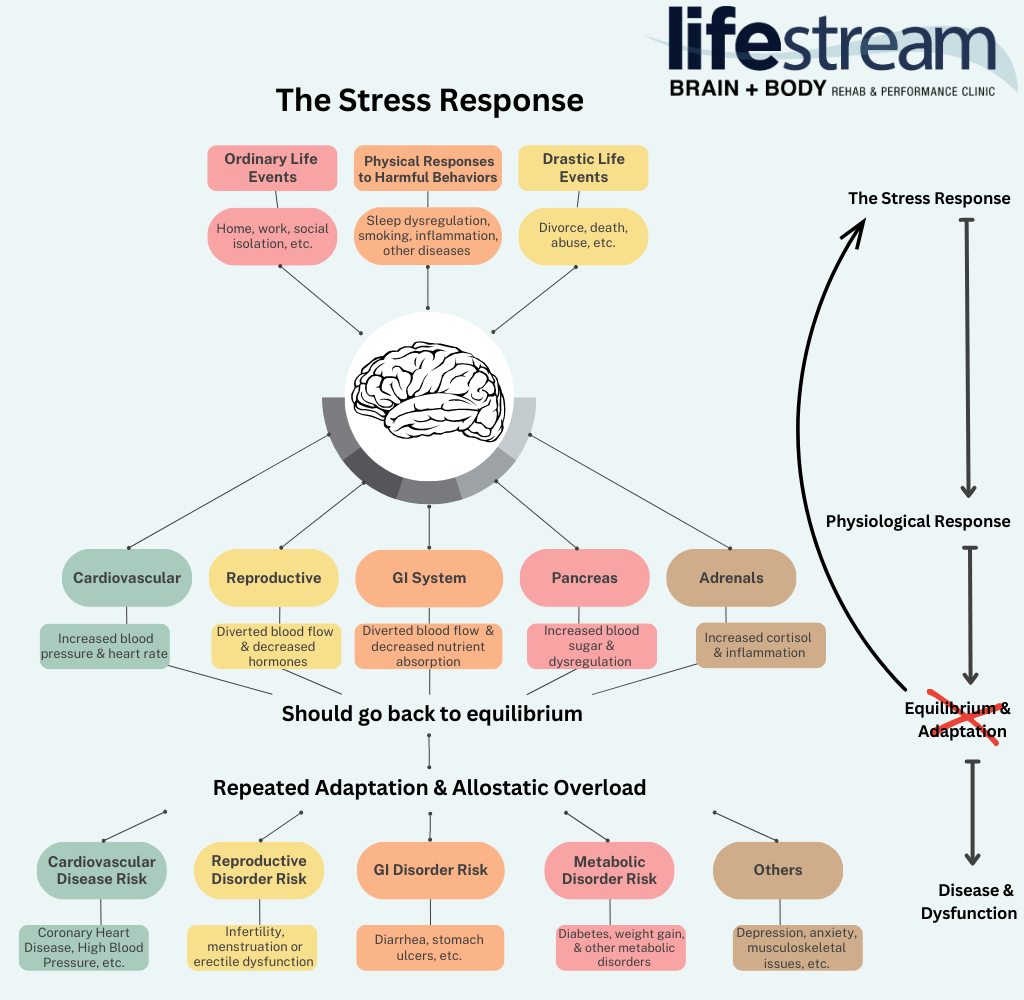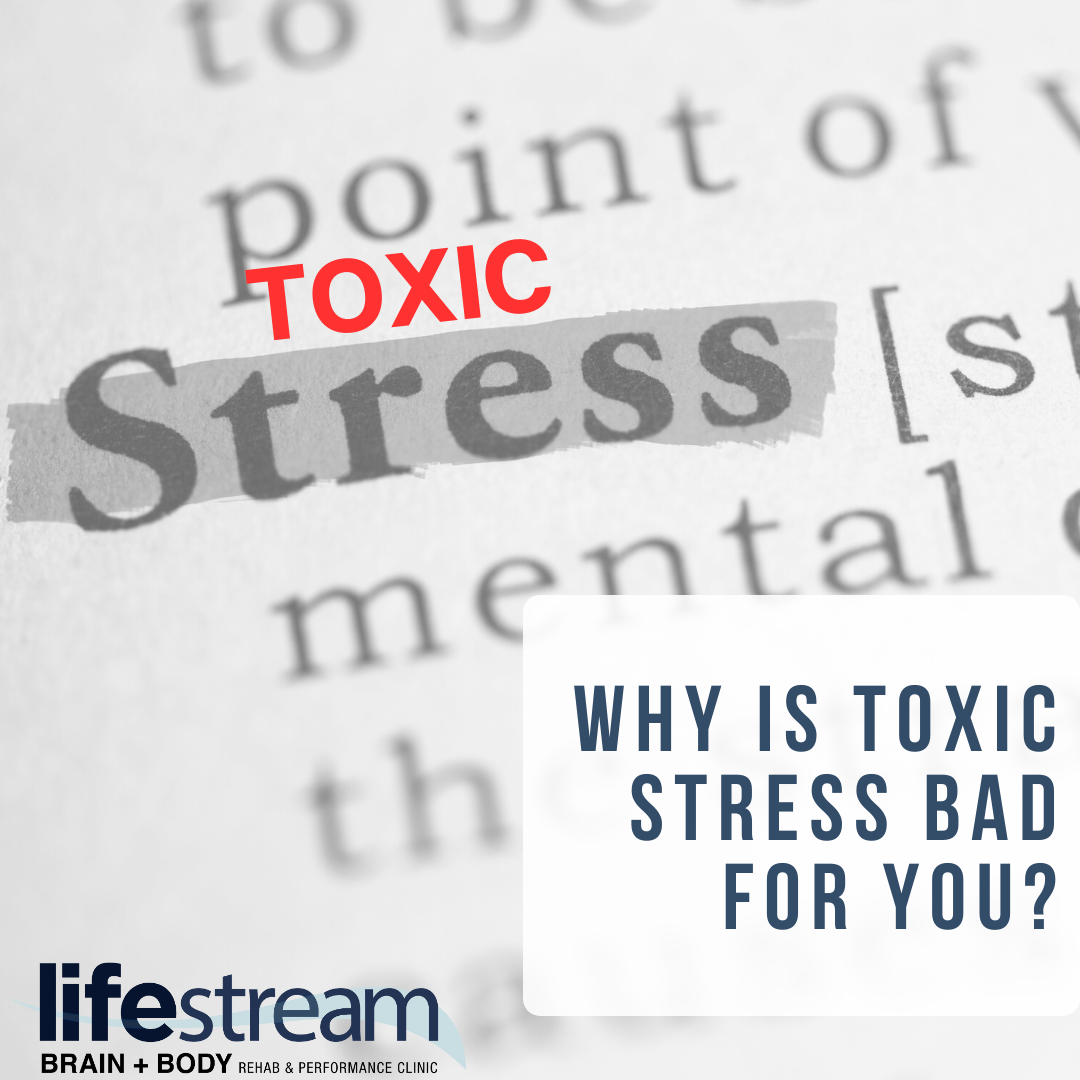Toxic Stress Overload
When we encounter a stressful situation, our bodies have specific responses (we’ll call this a stress response) that allow us to adapt to the present physical or psychological stimuli. Our bodies were designed with this built-in defense mechanism to be able to respond to life or death situations and survive. This is where the “fight or flight” term comes from. Here is an example of what happens in our body during a stress response:
Stress hormones and other neurochemicals increase in the body which causes increased heart rate, blood pressure, and blood glucose- all with the objective of supporting the possibility of needing to expend energy to protect ourselves. The body even begins to shutdown or divert energy away from the body systems that are unnecessary at that moment like the digestive or reproductive systems. You don’t need to worry about procreating or eating a large meal when you’re running away from a bear, right? That’s the idea here.

Under normal circumstances, once the stressor is no longer present or even with a moderate amount of stress, your body is able to adapt and go back to more of a “normal” state where these stress responses are not as ramped up. However, when those stressors are chronically present, your allostatic load can increase. “Allostatic load” refers to the cumulative effects of strong, repeated, or prolonged stressful experiences (regular life situations, drastic life events, and/or consequences from unhealthy behaviors such as poor sleep, smoking, chemical toxicity, etc.) in one’s life. Allostatic “overload” or “toxic stress” occurs when an individual is no longer able to cope or adapt with these physical responses that the body has in response to the stressful experiences.
Our bodies are designed to be able to handle and even thrive on acute, or short-term stress. For example, the physical stress from a hard workout or nervousness that comes from a public speaking engagement or during an exam. Our bodies are able to make little adjustments to be able to cope with a particular situation as long as it is able to return to more of a normal state. However, when this stress becomes chronic and doesn’t ever die down, these hormones and physical responses begin to cause damage to the systems involved in the stress response and cause dysfunctional responses that can lead to things like heart disease, psychiatric disorders, digestive issues, weight gain, infertility, and much more.
Children are particularly susceptible to toxic stress because of their impaired ability to cope as their brains are in a sensitive period of development. Permanent changes in brain physiology and poor health outcomes like immune dysregulation, persistent infections, and various diseases as adults can happen as a result.
What can you do then to prevent toxic stress from occurring and limit your toxic load altogether?
Some situations cannot be controlled like a drastic life event or a stressful work situation. What can be controlled, however, are other lifestyle habits such as exercise, sleep patterns, and food choices.
Here are some tips for limiting harmful behaviors that could contribute to allostatic load:
– Establish consistent and sufficient sleep patterns: Most adults need at least 7 hours of good sleep per night. Try going to bed and waking up at the same times every day, put away the electronic devices one hour before bed and do something relaxing like take a shower or read a book before bed
– Eat a low-inflammatory diet rich in fresh fruits vegetables, fiber, and healthy fats and limit your added sugar and processed foods
– Exercise for at least 150 minutes of moderate activity or 75 minutes of vigorous activity per week
– Try to work with your doctor to decrease any other harmful activities such as excessive drinking or smoking
– Do what you can to limit your chemical toxicity like using cleaner products and ensuring you’re consuming clean water and fruits and vegetables
– Support your body’s own detoxification by eating more fiber, eating plenty of the necessary nutrients, eating plenty of protein, and consuming antioxidants
Although you cannot control the stressful situations that appear in your daily like like work or family, you can incorporate stress reducing practices in order to support your response to these stressful situations.
Here are some ideas for reducing stress in your life:
– Talk regularly with a trusted family member, friend, or counselor to work through normal or drastic life situations
– Adopt stress reducing activities such as: journaling at night to write down stress from the day, connect with other people, get outside as much as you can, and/ or stretch before bed to release muscle tension
https://www.ncbi.nlm.nih.gov/books/NBK541120/
https://www.sciencedirect.com/science/article/pii/S0306453019301581
https://www.hsph.harvard.edu/nutritionsource/stress-and-health/
https://www.ncbi.nlm.nih.gov/pmc/articles/PMC4928741/
https://pubmed.ncbi.nlm.nih.gov/32799204/
https://www.health.harvard.edu/staying-healthy/understanding-the-stress-response
https://www.nationwidechildrens.org/family-resources-education/700childrens/2017/07/toxic-stress-how-the-bodys-response-can-harm-a-childs-development#:~:text=Children%20are%20especially%20vulnerable%20to,and%20sensitive%20period%20of%20development.
https://www.jneurosci.org/content/40/1/12
https://www.cdc.gov/sleep/about_sleep/how_much_sleep.html
https://www.ifm.org/news-insights/toxic-exposures-cumulative-effect/
https://www.cdc.gov/emotional-wellbeing/features/reduce-stress.htm
https://www.ncbi.nlm.nih.gov/pmc/articles/PMC6770193/

